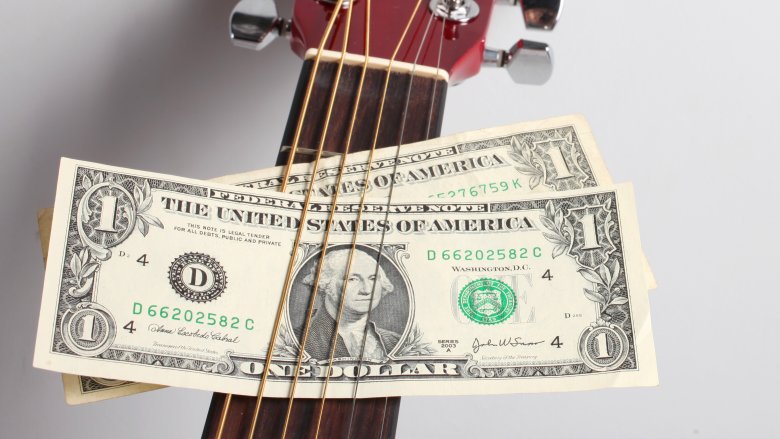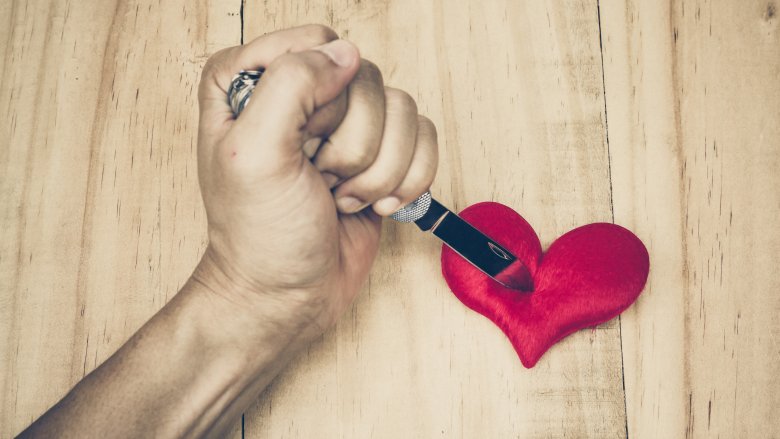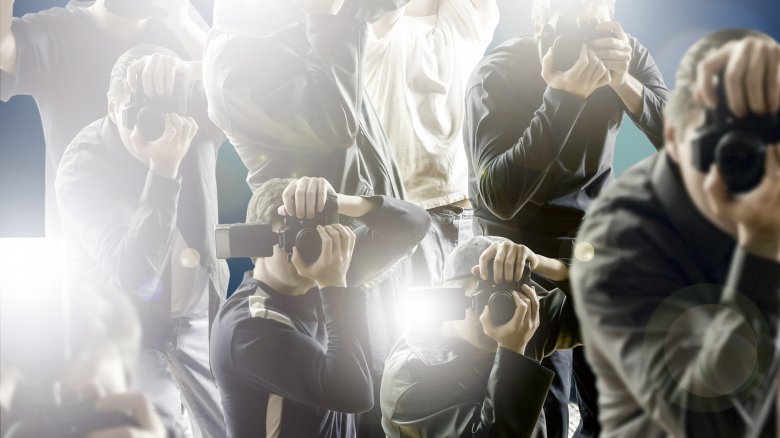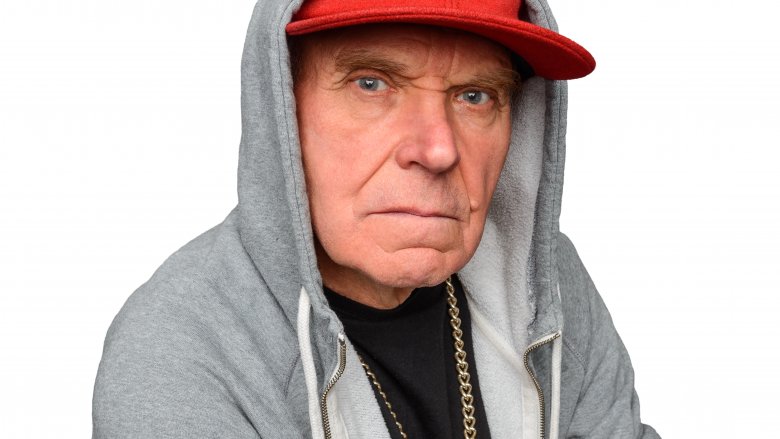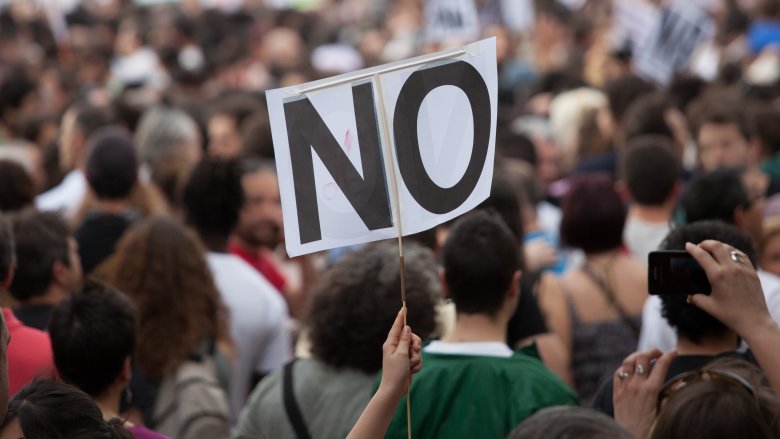Why It Sucks To Be A Rock Star
It's finally happened. You've spent years pouring every minute of downtime from your crappy job into your garage band, subsisting on an all-ramen diet and piloting your '79 Ford Econoline to the seediest venues in the country to advance your music career. Against all odds, some scout at some venue said something to some suit, who sent you into the most awesome studio you've ever seen in your life to record the three-song demo that has led you to this moment: signing a major-label record contract.
You're obviously an insanely talented and driven guy or girl who has sacrificed a lot to make it this far. Congratulations! Now prepare to get royally hosed. If the career trajectories of practically every artist ever are any indication, it doesn't matter how much your music rules — your life as a rock star is going to suck.
Your entire advance is going away
The first number that'll jump out and grab you by the face when you read that contract is the advance. Maybe you've already dropped a hot regional release or been the subject of a bidding war. That advance is a pretty serious chunk of change. If you'll refer to the contract in front of you, you can see that you and your bandmates are getting a check for a cool quarter million, just for signing! It's time to cash that check into small bills, dump them on the hotel room floor, and roll around while screaming "cha-CHING!" until you're all hoarse. While you're at it, kiss all that money goodbye, because it probably isn't really yours.
It's a shockingly common practice for the label to recoup all expenses associated with recording and promoting a release out of this advance. In his legendary essay The Problem With Music, producer Steve Albini broke down exactly what this looks like according to the terms of a standard deal. After the recording budget is deducted, a slew of people (managers, producers, and promoters) get cuts, and about a billion incidental expenses are covered, each band member might walk away with a few grand — and this is even with profits from your album's sales accounted for. Some kind of high life.
Your royalty checks will be a joke
Those sweet royalties are not where the money is. You see, in a crowded music marketplace, your label can't simply promote you for a little while and then stop, and promotion isn't free or cheap. These expenses can and will continue to be deducted from whatever royalty rate you've negotiated. This is how platinum-selling artists with multiple top hits like TLC can end up dead broke. Lead singer Tionne "T-Boz" Watkins has filed for bankruptcy twice: once in 1995 — during the very time that "Waterfalls" was topping the charts – and again in 2011. At that time, she only earned about $1,200 per month from the royalties of the second-best-selling girl group of all time behind the freaking Supremes.
This has obviously been a problem in the music industry for a while, and the advent of streaming has only made it worse. You might be totally psyched to see your album start racking up streams on Spotify, but you'll be considerably less psyched when your first check looks like you earned it working at Safeway. A million streams can earn you only a few thousand dollars in the best case and a hell of a lot less in the worst, and you'd better hope most of that doesn't get dumped right back into promotion. No, if you want rock star money, you're going to have to live the rock star lifestyle — on the road.
You're going to have to tour constantly
You've ditched the Econoline for a sweet tour bus, and now instead of playing to 20 or 30 sweaty dudes and chicks, you're playing to like 10,000 extra-sweaty dudes and chicks. Plus, you're finally getting paid — your band is pulling down well over $100,000 for every performance, so the cash is flowing freely. It's like a dream come true, until you suddenly realize that you've been touring nonstop for over a year, you're exhausted, and you have a week off before the next tour starts again.
Not only is this a necessary part of promotion if you want the public to remember you for longer than four days, it will become absolutely critical to sustaining your lifestyle. Let's face it: while on the road, you won't be eating at McDonald's every day, then retiring after each night's performance to a six-pack of Pabst and a peaceful slumber. You're going to be spending the hell out of every dollar you make on rich food, expensive booze, and crazy drugs while keeping the sleep schedule of a literal vampire. By the end of each tour, you'll have surprisingly little cash in the bank, your health will be in the toilet, and it'll feel like you have about six seconds to recover before it's time to do it all again. It's just how the industry works — only about the top 10 percent of artists end up seeing much of anything from their sales. You're not one of those, so saddle up.
Say goodbye to your artistic integrity
It won't take more than a few years of this before you either sail over the screaming edge of madness, or decide that there must be an easier way. You've never been fond of sailing, so you and your bandmates eventually call a meeting, and in this meeting it will be decided that it would be beneficial to your careers if you were to aim for a slightly more accessible sound, in order to widen your audience, see more of your sales profits, and maybe spend more than one week per year at home with your dog, who may not even recognize you anymore. These are the words you'll use, but you will really be agreeing to sell out harder than the biggest sellout phonies who ever sold out.
Now, don't take this the wrong way. Nobody's judging you here — not yet, anyway, this is years down the road — and selling out can even be really good for some bands. Heck, the Beatles didn't really become The Beatles until after their manager made them change their entire image and sound, right down to those stupid mop-top haircuts. The greatest rock band of all time did it, and you can just keep telling yourself that as your band begins churning out fluff that a pre-fame version of you would hate.
Your fans will be completely insane
Everybody knows that celebrities of all stripes have crazy fans, but as a rock star, yours will be an extra-special blend of crazy. It's doubtful, for example, that Liam Neeson ever had a wild-eyed female fan seize on one of his discarded jock straps, wring the sweat from it, and drink it in front of him. But this very thing has happened to Red Hot Chili Peppers bassist Flea, an incident that drummer Chad Smith never seems to get tired of talking about. See, music is an intimately emotional form, which causes some unhinged people to perceive emotional connections with an artist that may not exist, but which will prompt them to repeatedly break into your house or leave ritual sacrifices on your doorstep if the mood strikes them.
Stalkers of musicians also seem to turn overtly violent disturbingly often. Just ask Bjork, if you can get within half a mile of her; she had a "fan" attempt to mail her a bomb before committing suicide on videotape. You certainly can't ask John Lennon, Selena, Dimebag Darrell, or Christina Grimmie, who were all killed by their "fans." So just to be safe, anytime anybody asks you for an autograph, you'll probably want to go ahead and mace them.
You'll live your best years in the public eye
This connection that fans feel with their favorite artists isn't limited to just the gibbering crazies. There may be three or four "casual" music fans out there somewhere, but most people's identities are pretty strongly tied to the music they listen to. This wasn't so problematic when fans simply showed their support by wearing Toad the Wet Sprocket T-shirts, but fans in the age of the internet expect more from their artists — a hell of a lot more. They basically expect artists to act like their buddies, to be constantly available and responsive on social media and to let them in on every aspect of their awesome lives.
Then, of course, there's the endless paparazzi and years of never-ending opportunities for you to make a jackass of yourself in public in those special ways that only rock stars are able to really pull off. Think bald-headed Britney Spears or anytime Axl Rose sets foot onstage or anything Kanye West has ever done. It's like being the most popular guy in high school, only high school is the whole world, you never graduate, and instead of talking behind your back in the hall when you lose the big game, they'll be mocking you all over the internet when you pee on the red carpet at the VMAs. Also in this high school, you keep getting older while everyone else stays the same age — but not in that cool, McConaughey-type way.
Then comes the fight to remain relevant
If your whole selling-out strategy is sound enough to keep your career afloat for a couple decades or so, you'll start to notice something strange: most of those attending your concerts will now be old people. If you throw on a fake mustache so as not to be recognized and go ask one of these people what they think of the band, they'll probably say at some point say the exact words "their older stuff was better." This is because your first couple albums were made when you were young and passionate, and so were they, and those albums make them feel that way again. Your newer releases do not, because you're now a sellout, and also old and stupid.
Unless you're David Bowie, who was an alien, there's simply no way to put together a multi-decade career in popular music and remain relevant. Popular music is youthful and rebellious and you're no longer either of these things. Bands that plug on for 40 years may still collect paychecks playing for ponytailed balding guys, but nobody is going to suggest that U2, the Rolling Stones, or the Chili Peppers have come within shouting distance of musical relevance for decades — and those are great, iconic bands. They couldn't pull it off, and you won't either. But you'll try, and here's the real kicker — the closer you come to succeeding, the worse it's going to get for you.
Your fans will suddenly hate you
Believe it or not, your fans won't want you to mount a late-career resurgence to re-invent rock or rap or dubstep or what-have-you. They don't even want you to try. If you're going to make records for 30 years, you'd better make the same damn one over and over again. Just ask AC/DC, which has racked up sales of over 200 million doing exactly that with absolutely no pushback from their fans. Try thinking way outside the box and doing something wildly creative — even if it's pretty good — and fans will stop only long enough to, again, mock you on the internet before returning to the hot new floobstep track.
But even repeating yourself isn't an option, what with your sellout phase, and "returning to your roots" will just be seen as an obvious attempt to pacify fans of your "early stuff." Just ask Metallica, whose career followed pretty much that exact trajectory and whose first attempt at roots-returning (St. Anger) was greeted with all the enthusiasm of a colonoscopy. It's become fashionable among metal fans to hate the guts of one of the greatest metal bands of all time, mostly because they had the shocking audacity to try to do different things over a career of three-plus decades. After that long, it's inevitable that you'll realize that younger fans of your genre think you're a dinosaur, and the music they like will sound like utter garbage.
Your entire genre will pass you by
After much time, your genre of music will sound totally different from when you were in your prime. Hell, it might not even sound like the same genre at all. For a glaring example, take rap music, a relatively young genre that has risen to dominate pop within the last 25 years or so. "Golden age" rappers of the '80s and '90s focused on wordplay, rhyming, and verbal dexterity, but somewhere along the line the genre underwent a genetic mutation, and today's rappers focus mostly on unintelligible grunting. Snoop Dogg has gently and diplomatically pointed out that it can be difficult to tell them apart, and if you were to ask him privately, he'd probably just shake his head and blurt out angry curses between puffs on a giant blunt.
You will be just as angry and confused one day because — and this is a cruel twist — these new guys don't have the same influences as you. They were influenced by you, and they twisted that influence to their own creative whims to make something new just like you did with your influences. It might sound alien and weird to you, but if every band influenced by the Beatles sounded like the Beatles, we'd have about a thousand fewer subgenres. Music itself grows and evolves in a way that few individual artists ever do. It's a beautiful thing, but it only cements the fact that everybody under 35 now thinks you're a washed-up schmuck.
You will eventually become a parody of yourself
Unfortunately for you, you haven't picked up any marketable skills since you were a teenager, and rock stars aren't exactly known for their robust retirement accounts. Your only viable option will be to keep on rocking, rapping, or dubstepping at whatever county fair or dive bar will book you until you're literally dead, an ironic return to your pre-fame roots. That is, unless you've managed to sell a truly ungodly amount of records. In that case, you'll be playing to arenas full of old codgers long past the time that a person of your age should be in a retirement home.
You'll be a walking cliche, an old guy in an old getup playing old songs to old people, a parody of the awesome band you once were. It'll be enough to make you wish you'd checked out early like all those old rock stars that everyone still loves because they had the good sense to die before they got old. All the young artists with their hinkystep machines will be taking over the world, oblivious to the fact that one day, they'll end up just like you — a forgotten footnote if not a punchline, having poured their souls into an industry and a public that ultimately just didn't care.
So ... are you sure you wanna sign that contract?


